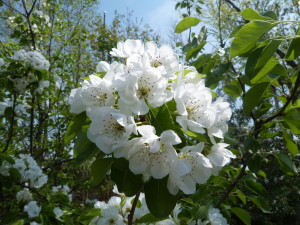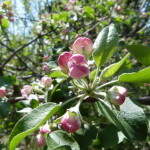 What hampers new beginnings of all kinds within the human experience are ideas that things cannot be different than they once were. T3:15.2
What hampers new beginnings of all kinds within the human experience are ideas that things cannot be different than they once were. T3:15.2
It is spring! Only one week ago, I was looking down from the airplane at the ground of my home town, seeing nothing but the drab colors of pre-spring. In a matter of days, lovely, sunny days, spring has sprung. It is no wonder I am thinking of new life!
It is also Sunday and I get to create. As onerous as it can feel when I have a deadline, or no particular inspiration with which to start, I still have the feeling of “get to.” This is time I’ve set aside. It is as anticipatory as my grandson’s play dates.
Still, sitting down empty-minded, I pick up Joyce Carol Oates to get myself in the mood, and there is nothing but ideas. Ideas upon ideas. Lovely and orotund language that calls me to little more than increasing my vocabulary.
Then I turn the page:
“The queer passionate impulse that overtakes me, as I write, to tell the story; to complete an emotional or psychological or narrative unit; to finish something that is begun . . .. None of this can be unique to me but must reside very deeply in us all . . . trying to plumb some ineffable center, some essence, the more profound for being so very secret.” (399)
Have you ever noticed that you get no inspiration until something touches on what was already there?
To finish something that is begun. To bring it to completion. New life is also about endings. Each new beginning seems to take in all the endings and beginnings of the past. I look out the window at the sun rising and this point seems mute. I sit within the homeliness of the cabin. The bare bones of it like the individual life, essential and ephemeral; lasting and passing at the same time. Joyous and melancholy. The both/and of a rich life.
new beginning seems to take in all the endings and beginnings of the past. I look out the window at the sun rising and this point seems mute. I sit within the homeliness of the cabin. The bare bones of it like the individual life, essential and ephemeral; lasting and passing at the same time. Joyous and melancholy. The both/and of a rich life.
I decide to look up the use of both/and in A Course of Love. There are only a few instances where I thought there would be many. Yet the “feel” of such acceptance is contained throughout.
The both/and of endings and beginnings have been inspiring my reflection since my return from New York. With a little remove from the whirlwind of it, I feel as if I have identified the source of my fervor: The desire for new life. It is in me and it is in many. The desire is palpable. It has arrived. It is contagious.
 The beginning of new life arrives as “feeling.” The feeling puts you on notice that this is a happening. Your new beginning has begun. It began inside of you and it is bursting to become manifest. Change on a grand scale, change to the very nature of the self described by the words human being (T3:15.16) is predicted. Jesus says this calls for forgetting, and for letting go of limitations. But before he gets there, he also accepts our stories:
The beginning of new life arrives as “feeling.” The feeling puts you on notice that this is a happening. Your new beginning has begun. It began inside of you and it is bursting to become manifest. Change on a grand scale, change to the very nature of the self described by the words human being (T3:15.16) is predicted. Jesus says this calls for forgetting, and for letting go of limitations. But before he gets there, he also accepts our stories:
You are a thought of a God. An idea. This thought, or idea, is what you seek. It can be found only at its source. Its source is love, and its location is your own heart. Think a moment of a novel or movie with no plot. This would be the same as saying that there was no idea brought to completion within the pages or on the film. In God’s idea of you is all that is known about you. God’s idea of you is perfect, and until now your form has been but an imperfect representation of God’s idea. In God’s idea of you is the pattern of the universe, much as within a novel, movie, piece of music, invention or artistic idea is the completion of the pattern that will make that idea a masterpiece. An idea is irrevocably linked with its source and one with its source. There was no God separate from you to have this idea of you. You were birthed in unison with God’s idea of you. . . . Acceptance of your birth in unison with God’s idea of you is acceptance of your Self as co-creator of the pattern of the universe, acceptance of the idea or the story that is you. (C.26.22-23)
I love that last line: acceptance of the idea or the story that is you.
We, in all our various stories, are part of this happening. Yes, we are closing out the old even as we become the new. But “the new” feels so inclusive of “who we are,” of the stories that are ours. This “narrative” has been missing from much of new spirituality, as if “the story” has no bearing on what is or is to be. I, at least, see the story as part of the uniqueness of who we each are and of what we each will bring forward. The re-writing of our stories can also be essential, and part of how we find ourselves newly. Yet re-writing does not mean deletion or invention. It means re-vision. Visioning newly. As we leave learning behind, such ways as revisioning become tremendous means of discovery, and sharing what we discover, is an exceptional means of enhancing our union in relationship as we create the new . . . together and as one.


How lovely to find you here, Jacques, and to find you speaking of unity, nearness and closeness. Yes, this is a delight.
Thank you Mari, Robyn and Paula. I took great delight at reading your poem Paula. Yes BOTH/AND, ALL/AND.
Reading it gave me a feeling of unity, of nearness, of closeness.
Isn’t what the world is all about? Re-uniting. Separation is disappearing. What was it?
Mari, this particular post of yours has called me to read it several times. It feels edgy, like at the beginning of a new chapter or era. There is so much I could say about my responses to it, about endings, about our stories, about your “bare bones” hermitage (how wonderful is that!) where you can find solitude and go deep, and on and on. I printed it out to make it more available. Thank you. I ‘dared’ to share some of my story recently in response to your queries and after I posted it wondered if it was ‘appropriate’ for the group or too self-disclosing. Then I let it go, WTH, it is what it is.
I do want to comment on your words “The both/and of a rich life.” Both/and keeps coming to me. Just this morning I read in ACOL D,36.18 and D, 37.3 the words of Jesus encouraging us away from either/or toward both/and. Also in the Chat Room, that came up several times in the conversations I was reading. It is such a generous, open-hearted stance toward life isn’t it. It feels so free– especially from judgement.
Back in 2013 I wrote a poem by that title. I know I posted it the beginning of April in the chat room, but I just feel to bring it forward again. It was one of the poems that came so fast and needed little revising (unlike some of them I sweat over, abandon, pick-up again until they feel right). And it’s a poem I like. Some people have given me a bit of a hard time because I don’t take evil seriously enough.
BOTH/AND—
Good and bad
Chase each other round in a circle
Until—
No one knows which is which
Right and wrong
Keep borrowing each others’ clothes
Until—
Its likely people are getting fooled
Strength and weakness
Keep morphing into each other
Until—
Each contains the other
What to do in circumstances like these?
Maybe we can stop with the labels
And acknowledge that contradictions reveal truth
Meanwhile we don’t have to understand a lot
In order to dance a dance
Of gratitude
The way a puppy does
When it knows you are making its meal
Turning in circles and leaping about
Little paws clicking on the floor
In ecstasy.
Paula Hardin, July 30, 2013
How wonderful, Paula, to receive a response that calls something that I wrote edgy! For saying your response to it needed some reflection. For furtherance of the both/and theme (which is maybe the very edginess of the post), and for your poem which feels light but reveals depth. These mediums in which we share are providing far more than I imagined they would, and yet less (at times) than I truly desire. You always make me feel I’d like to have a conversation with you, share a cup of coffee, share stories. I have just had a cup of coffee “with you.” It was wonderful. Thanks!
Yes to a new now embracing all that was and is , lighting the way with love.
Thank you for your response, Robyn.